#Action française
Explore tagged Tumblr posts
Text
youtube
#Dictionnaire de conscience révolutionnaire#France#Tradition#Révolution#Georges Sorel#Pierre-Joseph Proudhon#Maurras#Action Française#Cercle proudhon#Edouard Berth#Pierre de Brague#Egalité & Réconciliation#E&R#résistance et Réinformation#Youtube
2 notes
·
View notes
Text
Episode 12 - Partie 7









Ceci conclut l'épisode "Tout s'effondre". C'est le moment pour du voyage dans le temps haha~
Maintenant je peux enfin attraper ma tonne de ruban adhésif et commencer à scotcher non seulement le future mais aussi le passé.
Aussi !
Je sais que certains d'entre vous lisent ce comics sans jamais avoir vu Rise. Maintenant, pour comprendre l'intrigue, je vous recommande de regarde le film du Destin des Tortues Ninja (sur Netflix) ou au moins lire son intrigue sur wikipedia haha. Sérieusement. Vous n'avez pas besoin de regarder la série entière, juste le film, ça prend une heure environ et le contexte du comics sera assez pour comprendre ce qu'il se passe ici là:)
-
Début de l'épisode | Précédent | Version Originelle | Prochain épisode
Masterpost
-
Tout les droits pour ce comics appartiennent à Cass
#Oui 😭 la version française de Rise of the Teenage Mutant Ninja Turtles est 'Le Destin des Tortues Ninja'#autant je savais que TMNT était juste le NT de la fin mais fouaaah 'le destin'???#genre destin les persos ont moins le contrôle sur leurs actions alors que Rise (Montée?) implique plus qu'ils n'était pas tout ça avant mai#le deviennent par eux-même#fin bon bref#cass apocalyptic series#La série apocalyptique de Cass
3 notes
·
View notes
Text
Tu connais pas encore Jungle Juice ?!
Alors laisse-moi te présenter ton prochain Webtoon coup de cœur GRATUIT sur Webtoon !
Jungle Juice | WEBTOON
🦋✨ Suchan est un étudiant modèle, populaire, parfait en tout...
Mais derrière cette apparence se cache un terrible secret : des ailes d’insecte ! 🐜😱
Un jour, il les dévoile pour sauver une vie… et sa propre vie bascule.
Rejeté par la société, il découvre un monde caché où vivent ceux qui sont comme lui…
Mais là-bas, c’est la loi de la jungle qui règne 🐍⚔️
➡️ Action, suspense, pouvoirs, survie et secrets... ce Webtoon est une DINGUERIE !
Lis-le maintenant :

#literatur français#wattpadfr#litterature française#écritur françai#écritur français#écriture#jungle juice#action
1 note
·
View note
Text
L'ombre des innocents
Auteur : René Manzor Titre : L’ombre des innocents Date de parution : 3 Janvier 2024 EAN : 9782702188620 – 365 pages 4eme de couverture : C’EST DANS L’OMBRE DES INNOCENTS QUE SE CACHE LE MAL Paris, bureau d’un éditeur bien connu. Alors que Marion Scriba, romancière, parle de son prochain polar, des policiers surgissent et l’interpellent, l’accusant du meurtre qui occupe la France entière…

View On WordPress
#action#aventure#Enfants#enlevement#enquête de police#Enquêtes criminelles#Espionnage#littérature#Littérature Française#Littérature Générale#Meurtre#militantisme#policier français#reseaux sociaux#Romans et nouvelles de genre#romans policiers et polars#sequestration#Suspense#thriller
0 notes
Text
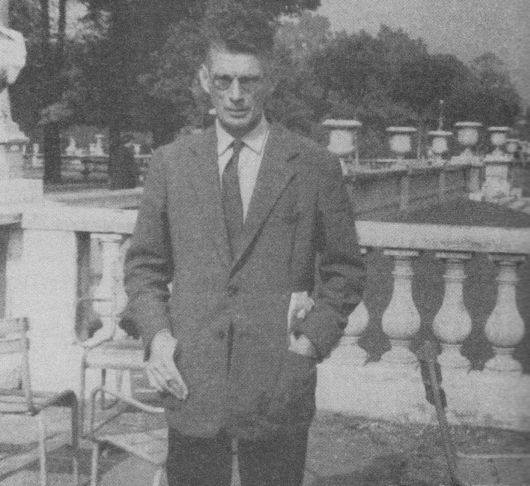
When he saw friends being persecuted because of their race, their religion, he couldn't stand by and do nothing.
He was shocked at the injustice, the discrimination, the violence. He was even more shocked at other friends, who said nothing or actually conspired with the persecutors.
Many lovers of literature know Samuel Beckett and his play, "Waiting for Godot". Beckett, who was born on April 13, 1906, was an Irish novelist, playwright, theater director, poet, and literary translator, who was awarded the 1969 Nobel Prize in Literature.
What you may not know about him is that he had a secret - he had been a French Resistance spy, who received the Croix de Guerre and the Médaille de la Reconnaissance Française from the French government for his bravery during the war.
For three decades after the war, only a few of Beckett's closest friends knew of his secret - when he risked his life as a liaison agent (and translator of secret reports). Beckett also narrowly escaped arrest by the Gestapo in Paris in August 1942, after many of his cell were betrayed and deported to concentration camps, according to biographer James Knowlson.
Beckett, who lived in Paris most of his adult life, was in France during the German occupation. As an Irish citizen, he was publicly known to be neutral, but, secretly, he was horrified, disgusted at what he was witnessing, seeing the rise of Nazism and racial hatred. He saw Jewish friends abused, assaulted, then rounded up and arrested. He decided to stay in France as a symbol of sympathy for his French friends.
When one of his friends was arrested and sent to a concentration camp, Beckett helped his friend's wife, with complete disregard for his own personal safety, giving her his rations.
The wife would say, "In 1941, my husband Paul Léon was arrested and was being starved and tortured by the Germans (we were all in Paris at that time). I was trying to get food packages together and it was an almost impossible task. Sam Beckett used to bring me his bread ration and also his cigarette ration, so I could get them through to the camp. I will never forget this great kindness on his part. At that time he was probably in almost as much trouble as we were, and he certainly needed those rations himself."
Another friend would be killed by the Nazis, which would embolden Beckett to join the French Resistance and a Paris-based cell of British SOE (Special Operations Executive).
Beckett would say as he saw his friends being arrested, “you simply couldn’t stand by with your arms folded."
“I was so outraged by the Nazis," he would explain, "particularly by their treatment of the Jews, that I could not remain inactive."
Beckett would later be known for writing "Waiting for Godot" which many view as a play on existentialism, of "doing nothing," but others have different interpretations.
Scholar Marjorie Perloff would actually see in Beckett's work "Waiting for Godot" as "the tension between passivity and action that characterizes this very particular form of waiting — a waiting on the part of human beings thrust into a very particular — and wholly unknown —situation.”
Reviewer Graham Hassell saw the play as "an allegory of the Cold War" or of French Resistance to the Germans.
Beckett actually wrote in "Waiting for Godot":
"Let us do something, while we have the chance! It is not every day that we are needed. Not indeed that we personally are needed. Others would meet the case equally well, if not better. To all mankind they were addressed, those cries for help still ringing in our ears! But at this place, at this moment of time, all mankind is us, whether we like it or not."
The Jon S. Randal Peace Page

27 notes
·
View notes
Text

















⚜ Le Sacre de Napoléon V | N°23 | Francesim, Paris, 1 Fructidor An 230
At the Tuileries Palace, Ernest informs Emperor Napoleon V of a plot involving anti-monarchist extremists financed by public figures. The Minister of Justice, Jeanne Chautemps, with prudent wisdom, advises rigor and caution in the investigation, while Napoleon V insists on the need not to provide their enemies with ammunition.
Meanwhile, the Emperor's grandfather Louis sought legal advice. His lawyer reassures him of his right to take legal action, promising to handle the matter discreetly. With this procedure, Louis could gain access to secret defense documents.
Beginning ▬ Previous ▬ Next
⚜ Traduction française
Au palais des Tuileries, Paris, 1er arrondissement.
(Ernest) Le témoignage de Madame Mère n’a pas beaucoup aidé à l’enquête
(Ernest) Manifestement, ces extrémistes font partie de groupes anti-monarchistes financés par des personnalités publiques
(Ernest) L’assassinat de feu votre père n’est donc pas totalement dû à l’évolution d’un groupe de manifestants enhardis
(Napoléon V) Intéressant (Jeanne) L’empereur Napoléon IV a déjà échappé à plusieurs attentats durant son règne
(Ernest) L’enquête nous révèlera des noms et des adresses. Nous pourrons alors dissoudre légalement ces groupes dangereux
(Jeanne) Le ministre de l’Intérieur s’en fera une joie, M. de Tour
(Jeanne) D’ici là, poursuivez consciencieusement l’enquête. Nous ne devons faire aucun faux pas et être irréprochables
(Napoléon V) Ne donnons pas raison à nos opposants.
À Paris, 7e arrondissement.
(Louis) Merci, Maître.
(Louis) Je crains que mon petit-fils, le nouvel empereur, ne soit pas d'accord avec cette démarche. Que puis-je faire ?
(Jean) En tant que père de la victime, vous avez tout à fait le droit de vous constituer partie civile.
(Louis) Oui, mais mon petit-fils détient maintenant le pouvoir. S'il s'y oppose... Je ne souhaite pas d'affrontement, mais je veux que justice soit rendue pour mon fils.
(Jean) Je comprends vos réticences. Cependant, la justice doit suivre son cours, indépendamment des dynamiques familiales. Nous nous en assurerons ensemble.
(Jean) Avec votre accord, je m'occuperai personnellement de la rédaction et du dépôt de cette plainte.
(Louis) Et que se passera-t-il ensuite ?
(Jean) En tant que partie civile, vous aurez accès au dossier et pourrez demander des actes d'instruction supplémentaires. De plus, vous pourrez assister aux auditions et aux confrontations, et demander réparation pour le préjudice moral et matériel subi.
(Louis) Très bien, Maître. C'est parfait.
#simparte#ts4#ts4 royal#royal simblr#sims 4 royal#sim : louis#sims 4 fr#sims 4#ts4 royalty#sims 4 royalty#le cabinet noir#episode iii#sim : jeanne#sim : ernest#sim : oldlouis#sims 4 royal family#sims 4 royal simblr#ts4 royal family#ts4 royal simblr#ts4 royals#tuileries#paris#sim : jeanlawyer
46 notes
·
View notes
Note
do we have good sources on the life and work of claire lacombe? /gen

Portrait probable de Claire Lacombe. Miniaturiste, Ducare. 1765-1798.
I am not the best person to answer this question, as I am currently delving deeper into my research on the group of the Enragés, particularly from a legal perspective, here https://www.tumblr.com/nesiacha/762409217481179136/jacques-rouxs-criticism-of-the-constitution-of?source=share (and also because I don't have much time). Perhaps @saintjustitude or @anotherhumaninthisworld, as well as other Tumblr users more specialized than I am on the subject, could provide better insights.
Nevertheless, I will offer my modest contribution on Claire Lacombe. The academic historian Antoine Resche has written a good biography of her, and historian Mathilde Larrère has also discussed her in depth. Unfortunately, I lost my notes from Jean Clément Martin’s excellent book La Révolte brisée: Femmes dans la Révolution française et l’Empire , as well as one of the most important references on revolutionary women, Dominique Godineau.
We know that Claire Lacombe was born in 1765 and was an actress who worked in Marseille,Lyon, Toulon then living in Paris. She was one of those women, like Théroigne de Méricourt, who proposed to take up arms to fight the tyrants. What I don’t understand is whether Lacombe was referring specifically to Louis XVI and La Fayette, or to other European monarchs as well (which is not impossible, as Théroigne de Méricourt, despite advocating reconciliation between the Montagnards and the Girondins, supported the idea of war). According to Mathilde Larrère, these two women, alongside Pauline Léon, are considered among the most well-known.
Claire Lacombe participated in the storming of the Tuileries in 1792 and received a civic crown like Louise Reine Audu and Théroigne de Méricourt. She was interested in the Jacobin Club before becoming secretary, then president, of the Société des Citoyennes Républicaines Révolutionnaires (Society of Revolutionary Republican Women). Along with other revolutionary women, she demanded the right to bear arms, something Olympe de Gouges, who wrote the Déclaration des droits de la femme et de la citoyenne , did not dare to ask for in the article addressing men’s right to bear arms.
Claire Lacombe grew closer to Leclerc and became a member of the political group known as the Enragés. She made several demands: the trial of Marie Antoinette, greater rigor in arresting suspects, the prosecution of the Girondins by the Revolutionary Tribunal, and the application of the Constitution. She also advocated for more social rights, as outlined in the petition of the Enragés (which would later be taken up by the Exagérés, who, unlike the Enragés, were less suspicious of delegated power and believed in wielding influence beyond the revolutionary sections).
Lacombe was first arrested in September 1793 but released the following day.The majority of the Convention, including La Montagne and what are called the exaggerated or the Hébertists, fought the enragés ( especially Roux and Leclerc) during this period . Her second arrest in April 1794, alongside Leclerc and Pauline Léon, lasted longer. Unlike the latter two, who were released after Thermidor—possibly due to their connections with Tallien (one of the few good actions of Tallien, it should be noted)—Lacombe was not released until August 1795, which is rather strange. Could it be that she didn’t have the right connections to secure her release? Or perhaps, out of disgust for certain Thermidorians, she refused help? Or was she simply forgotten?
In any case, there is no further trace of her political activism. She went to Nantes to resume acting before returning to Paris, where she fell into debt. We don’t even know the date of her death (something she shares with the revolutionary Marie Anne Babeuf). It seems she is among those revolutionaries who have been too forgotten, as we do not know what became of her.
Sources: Antoine Resche Mathilde Larrère
Feel free to check out, as I mentioned, Dominique Godineau’s book Citoyennes tricoteuses, which is very interesting, as well as Jean Clément Martin’s book that I’ve mentioned.
31 notes
·
View notes
Text
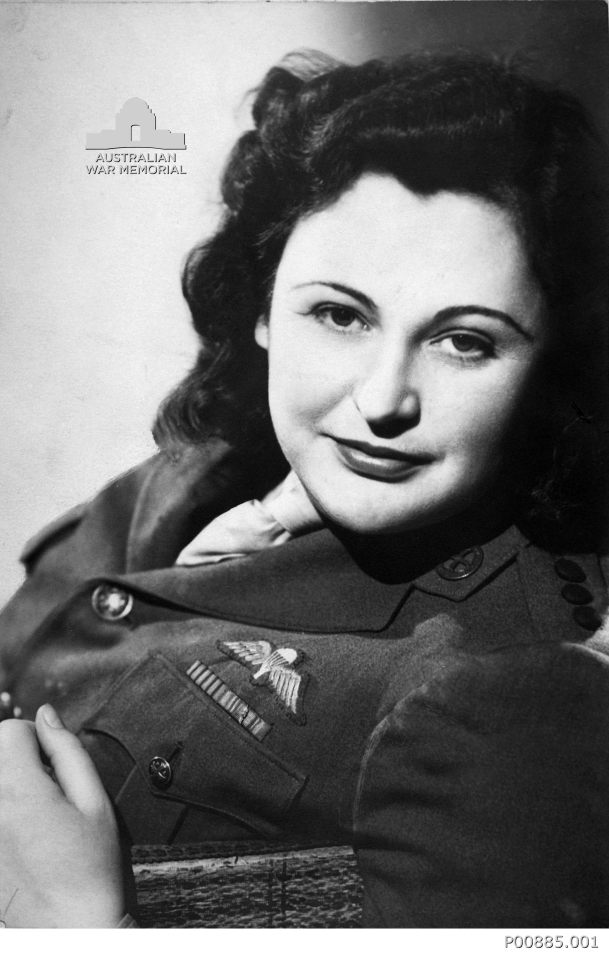
Nancy Wake – 1945
©Australian War Memorial - P00885.001
Nancy Wake est une journaliste australienne engagée dans la Résistance française pendant la Seconde Guerre mondiale.
Elle s'engage dans le réseau Pat O'Leary chargé de recueillir, soigner et exfiltrer les aviateurs britanniques. Pendant cette période elle sera surnommée "la Souris blanche" par la Gestapo en raison de sa capacité à leur échapper.
Elle est ensuite recrutée par le Special Operations Executive (SOE). Entraînée en Angleterre, elle sera parachutée en Auvergne pour armer et coordonner les actions du maquis avec les opérations du débarquement en Normandie. En juin 1944 elle dirige l'attaque du local de la Gestapo à Montluçon.
Nancy Wake est la résistante la plus décorée de la Seconde Guerre mondiale avec notamment la Croix de chevalier de la Légion d'honneur et la Croix de guerre avec 3 citations.
#WWII#ww2#résistance française#french resistance#résistance française de l'intérieur#rfi#les femmes et les hommes de la guerre#women and men of war#nancy wake#la souris blanche#white mouse#1945
18 notes
·
View notes
Text
I read a book about the development of nationalism, not realizing until about 75% of the way through that the book was written before Hitler's seizure of power. The book interests me in that, instead of deeming Nazism as a subtype of fascism, it considers both Fascism and Nazism to be derivative of "integral nationalism" the ideology of the late 20th century Action Française grouping.
8 notes
·
View notes
Text

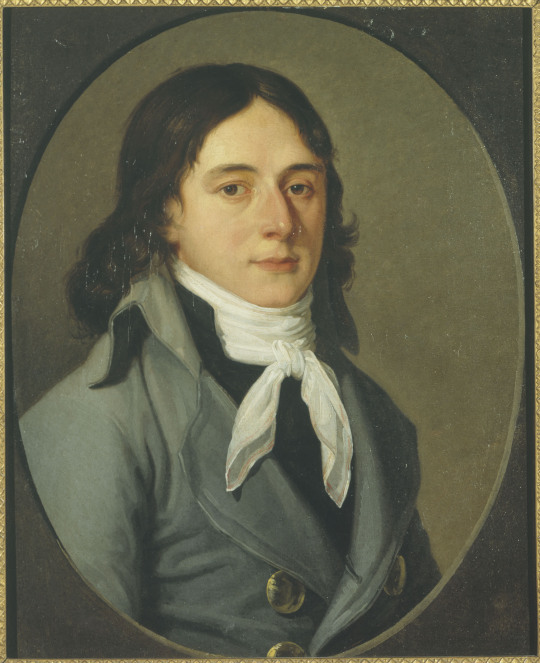
Plaque en hommage à : Camille Desmoulins
Type : Lieu de résidence
Adresse : 22 rue de l'Odéon, 75002 Paris, France
Date de pose : 1989 [inscrite]
Texte : Dans cette maison, Camille Desmoulins, 1760-1794, habita de 1782 jusqu'à son arrestation le 30 mars 1794
Quelques précisions : Camille Desmoulins (1760-1794) est un révolutionnaire français. Peinant à se faire un nom comme avocat en raison de ses problèmes d'élocution, il devient connu comme journaliste et adhère aux idéaux révolutionnaires, devenant une des principales figures de la Révolution française. Il appelle ainsi au port de la cocarde par les révolutionnaires, consacre la formule "Liberté, égalité, fraternité" et fait paraître un journal, Les Révolutions de France et de Brabant. En 1790, il épouse Lucile Duplessis, une autre figure importante de la Révolution. Député montagnard siégeant à la Convention nationale, il se montre toutefois mal à l'aise vis-à-vis de certaines actions prises à l'encontre de leurs principaux rivaux politiques, les Girondins. Devenu un adversaire de Robespierre, il est arrêté, condamné à mort et guillotiné, devenant l'une des nombreuses victimes de la Terreur.
#individuel#hommes#residence#revolution francaise#politiciens#journalistes#france#ile de france#paris#datee#camille desmoulins
11 notes
·
View notes
Text
Saint-Just – Robespierre relationship described by XIXth century (1st half) historians
If Vinot with his Pls do not misinterpret can be considered as ‘how it’s going’ than that’s ‘how it’s started’:
François Mignet “Histoire de la Revolution française”, 1824.
“Unlike Robespierre, he [Saint-Just] was a man of action. Robespierre, understanding how much benefit he could get from this man, attached him to himself the time soon after the Convention started its sessions. Saint-Just, for his part, was charmed by the reputation of incorruptibility Robespierre had, his austere life and the closeness of their beliefs."

They are not a mentor and a disciple, but equal colleagues, though a big friendship is not implied either. Saint-Just has little "screen time" in this book, but when he appears he acts either out of his own will (the accusation of Danton is fully his and Billiaud will and work) or out of his and Robespierre unanimity.
That is how he encourages robespierre before Thermidor:
"Saint-Just, who understood from their [CSP members] silence, from some words escaped, from embarrasment or enmity on their faces that there was no time to waste, urged Robespierre to act."


Thomas Carlyle "French Revolution: A History", 1837
Strangely, he didn't finde a place between his wordplay to say anything on our matter. And thanks god, because it would be ablolutely ahistorical, just look how he describes Saint-Just:

Alphonse de Lamartine "Histoire des Girondins", since 1847
"At that time Robespierre and young Saint-Just, one already famous, the other still unknown, lived in that familiar intimacy wich often unites a master and his disciple."

"It was him [Saint-Just] who, in endless conversations during the long nights under Duplay's roof, fought what he called weaknesses of Robespierre's soul and his disgust with shedding the king's blood."

"Robespierre was the only one man who Saint-Just worshiped as a suprime thought regulating the Republic."

Lamartine depicts Saint-Just always translating Robespierre's will in the Convention, but in privat he, from the very beginning, has his own mind and, closer to the end, begins to dominate.
(Now I feel that I have to notice that it's not me quoting only about Saint-Just, but Lamartine seeming to be uninterested in Robespierre in this matter. Anyway, this book has Saint-Just striping so it's still good.)
Louis Blanc "Histoire de la révolution française", since 1847
"He had a misterious attraction to Robespierre, an irresistible one that defeated him, that survived their fall and was preserved even on the eshafaud."

"Robespierre himself, already partly changed by the endless persecutions by Gironde, couldn't resist. And everyone noticed that his blood soured and altered in his veins when he put on the Deianira's shirt that was to him a friendship of Saint-Just."

Though the last quote presents Saint-Just in a bad light, the author is actually pro-Saint-Just. I was shocked when I went thorough my bookmarks and found out that this two quotes are the only one (except the one in wich the auther is extremelly disappointed by Robespierre finally followin Saint-Just in Danton Execution Question), since it was the book that made me believe in their outstanding friendship. And then I realised that it just depicts them here and there, colorefully and with details, agreeing and arguing, being good pleople, not being good peaople and so you conclude by yourself: there was a Feeling.
On this good note I cease.
#frev#french revolution#saint just#robespierre#no really saint-just striping is the best part of lamartine
16 notes
·
View notes
Text
Happy 199th birthday to Empress Eugénie de Montijo of the French, The last woman to be head of state of France. May 5, 1826-Jul 11, 1920
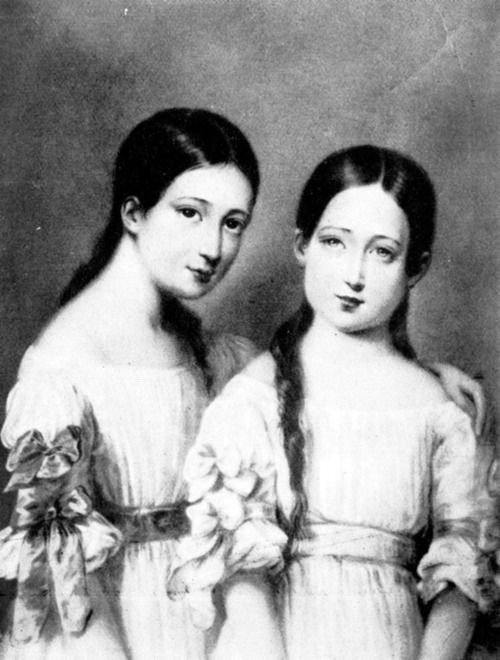

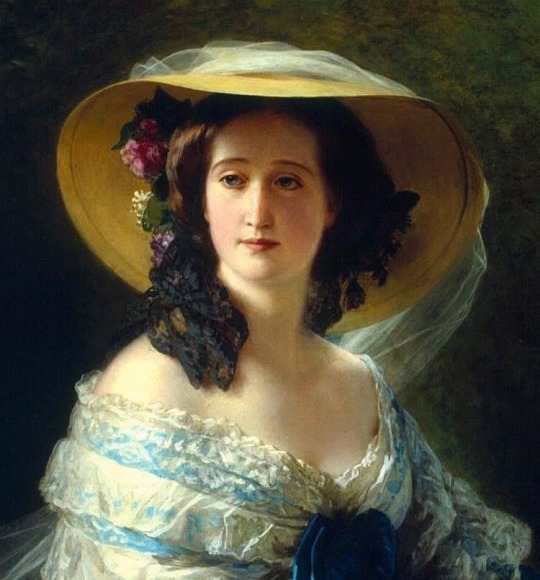
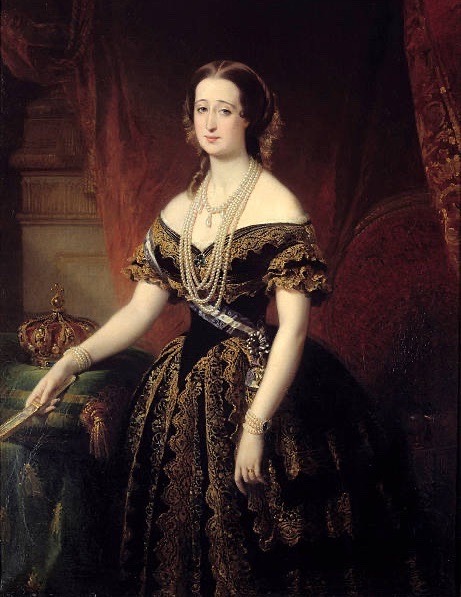
Born in Granada on May 5, 1826, Her father, Don Cipriano, was a fervent admirer of Napoleon: he supported the reign of Joseph Bonaparte, who had been placed on the Spanish throne by his brother Napoleon. This earned Don Cipriano some enemies when the French Empire collapsed, including the new King of Spain, Ferdinand VII. And so, as soon as it had the necessary funds, Eugenie’s family, which loved all things French and had admired Napoleon, moved to France in 1835.
From youth Eugénie embraced Bonapartism and developed a strong interest in politics , under the influence of Eleanore Gordon, ironically a then former mistress of Louis Napoléon.
Eugénie first met Prince Louis Napoléon—then President of the Second Republic—at a reception at the Élysée Palace on April 12, 1849, alongside her mother. During their encounter, he famously asked her, “What is the road to your heart?” to which she cleverly replied, “Through the chapel, Sire.”
After becoming Emperor, Napoleon III publicly announced their engagement in a speech on January 22, 1853, saying he had chosen a woman he loved and respected over one selected purely for political gain. The couple married on January 29 in a civil ceremony at the Tuileries, followed by a grand religious wedding at Notre Dame the next day.
Napoleon III, who declared her “an ornament of the throne.” As Empress of the French, she embodied the virtues of Josephine—grace, piety, and strength—and used her position not merely for show, but as a platform for action
As Empress she championed charitable causes, she gave a new lease of life to the Société maternelle (Maternal Society), a charitable institution created by Marie-Antoinette; she visited cholera patients during the epidemics of 1865 and 1866; and she was concerned about the fate of children held in prison. She supported education for girls,—backing sculptor Camille Claudel, supporting George Sand’s nomination to the Académie française, and helping Julie Victoire Daubié become the first woman to sit for the Baccalauréat. She sometimes even took a stand in defence of controversial artists, for example in the 1857 censorship case of Charles Baudelaire’s collection of poems “Les Fleurs du mal” (The Flowers of Evil), though in vain.
She formed a close friendship with Queen Victoria to which she maintained an extensive correspondence setting out her husband’s positions in her letters.
After the fall of the Second Empire in 1870 She followed her husband and son into exile in England.
After her husband’s death, she dedicated herself to their only son, the Prince Imperial. After he had finished his studies, Eugenie sent him off on a tour of Europe to defend his right to the throne … But the Prince Imperial thought his legitimacy had to be won through military glory: despite the pleas of his mother he joined the British troops who were going to South Africa. He died tragically in South Africa in 1879, a loss from which Eugénie never recovered. She later built an abbey at Farnborough as a resting place for him and Napoleon III.
Eugénie lived quietly in exile and died in Madrid in 1920 at age 94
#Eugénie de Montijo#L’Impératrice#La Reine du Second Empire#favorite empress#second french empire#napoleon iii#napoleon#art#history#Bonapartist#napoleonic era
10 notes
·
View notes
Text

Mayotte
Un tiers de la population est sans papiers. Seule la moitié des habitants est française (ayant droit aux aides). Les statistiques concernent les habitations cadastrales (très minoritaires), et on sent le déni colonial partout dans les analyses journalistiques.
À Mayotte, on est dans les affres les plus extrêmes de la République. Une population blanche et assimilée, privilégiée de fait, utilise au quotidien l’avantage d’une population sous-payée qui vit sous les radars et au rabais, du fait de logements informels, de salaires au noir et d’une volonté de se faire oublier.
Ces populations échappent donc à toute règle, qu’elle soit sanitaire ou locative. Les propriétaires des parcelles indiquaient certainement qu’elles étaient squattées, mais les logeurs et les loyers existent partout ! Les propriétaires fonciers touchaient-ils une part des loyers (vu la densité de masures au mètre carré, la somme globale doit être conséquente) ? On ne le saura pas in fine, mais cet argent partait forcément quelque part… On peut imaginer, en revanche, la collusion tacite des autorités et les corruptions administratives et policières qui permettent à ces situations de perdurer. On les constate jusqu’en métropole, c’est dire...
Les revendications de ces travailleurs n’ont jamais abouti qu’à des sanctions pénales, des expulsions préfectorales, qui ne peuvent aboutir vu les relations avec les Comores. En revanche, les cercles mafieux, les marchands de rêve et les proxénètes, eux, échappent à toute mise au pas. Mais pas les soi-disant "meneurs politiques" des émeutes revendicatrices et donc démocratiques. Ces derniers se retrouvent déportés et neutralisés d’une manière ou d’une autre.
Et c’est là que la vase de la politique postcoloniale resurgit sous la fine pellicule de ciment tout frais. On retrouve du Bob Denard, des juntes mafieuses islamistes, des retournements d’ennemis et des sabordages d’anciens alliés. Cela ressemble à d’autres situations coloniales, mais celle-ci est tardive (1975) et tellement éloignée. Et elle concerne un président encore connu : Giscard.
Comme en Kanaky ou à Mururoa, le lointain révèle nos parts les plus sombres et les salauds les plus aventuriers de nos gouvernements. Il faut bien comprendre toutes les opérations secrètes des années 1975-1980, et celles qui vont suivre, pour estimer les soi-disant "indépendances" des pays et territoires sous l’emprise française.
Cela se traduit dans l’imaginaire et la création par la vague des romans d’espionnage des années 1980, notamment la série SAS. Gérard de Villiers avait ses entrées chez les salauds opérationnels. "Mais pas que" ! En reprenant une enseigne de transport aérien (au départ), puis sa concurrente Air France, en mélangeant les symboles du luxe petit bourgeois (Cognac Gaston Delagrange VSOP, Seiko Quartz pour SAS) et les attributs aristocratiques, il magnifiait un sexe de droite (souvent tarifé ou conditionnel, pornographique, éjaculateur précoce, violent, souvent abusif ou torturant).
Ces récits vantent les espions, barbouzes, agents secrets et leurs gadgets électroniques, mécaniques, connectiques, leurs poisons et leurs armes. Tout cela nous ramène à l’actualité explosive et à la tech meurtrière, qui a toujours la préférence de nos dirigeants. (Les années 1980, c’est le gadget partout et la poudre de perlimpinpin dans le nez ou dans les veines, pour mémoire.)
La France reproduit dangereusement ses dérives postcoloniales et ses dénis d’ingérence et de manipulation. Une transparence sur les actions passées, un enseignement des pratiques réelles et des faits permettraient de ne pas projeter toute une population métropolitaine dans des fantasmes républicains d’une France réifiée.
Non, De Gaulle n’était pas un "émancipateur" des peuples colonisés par leurs indépendances, et surtout pas par leur assimilation citoyenne. Il visait "l’intérêt supérieur de la nation", qui se confondait depuis l’avènement de la République avec celui des grandes compagnies marchandes coloniales.
Non, Giscard ne souhaitait pas l’accès des peuples colonisés à une revendication "majoritaire" en leur sein, quelle qu’elle fût. Les gouvernements successifs ont toujours privilégié l’accès aux ressources, la mainmise économique et les intérêts particuliers, ceci par des opérations secrètes, des manœuvres politiciennes et économiques. Ce sont des faits qui méritent l’éclairage pour une compréhension des situations catastrophiques qui s’enchaînent et de l’incurie des services de l’État aux confins de ses territoires.
On rappelle que ces services sont en mesure d’affréter à prix d’or un jet dans l’heure pour acheminer un tout nouveau Premier ministre vers ses obligations cumulatives d’élu, d’où il se permettra d’allouer une somme dérisoire, mais prélevée sur les fonds publics, à l’aide humanitaire pour Mayotte.
13 notes
·
View notes
Note
🤚 ^^
🤚Book recs
This is hard because I had stopped reading for many years and I've been trying to get on track in the last year. Overall, I have read many books, but the only ones I feel like recommending are all historical essays about the French Revolution and despite some being in Italian and French I will mention them anyway, given that some of my followers are also from Italy and France ^^
1. P. McPhee's Liberty or Death.
This book is very dear to me, because it was my first ever frev book! I recommend it because it's heavily sourced, explains very clearly the causes and consequences of the Revolution and the history is told, through the quoting of primary sources and accounts, from the people's pov, something quite unique in frev historiography. Unfortunately, this last point can also be a downside, especially for those who know absolutely nothing of the French Revolution: some of the key events sometimes get discussed in a few lines to give much more space to how they were perceived by the population. Not only this may lead to an oversimplification of said events, but also to confusion regarding their chronological order. At the end of the book there's a timeline though, which I suggest to consult in case you feel lost while reading.
I would say it's accessible to everyone interested in the topic and who has an adequate level of English to understand it. Of course, the read will be much more fluid if one already knows a bit about the French Revolution.
2. M. Vovelle, La Révolution Française 1789-1799.
This book exists only in French and Italian sadly. I say sadly, because despite not having read it in full, it's an excellent and concise summary of the French Revolution. It's perfect for literally everyone: students who have to prepare an exam, historians who have to quickly revise it and amateurs who want to be introduced to the French Revolution through something that's not too big or overwhelming. What I like about it, it's the fact it's short, but it manages to perfectly highlight the main events and key figures, showing how important the Revolution was and its consequences in our present era.
I believe an English equivalent would be Soboul's The French Revolution 1789-1799.
3. M. Reinhard, Le Grand Carnot vol. I & II.
Yes, a specific biography, I mean it seriously. Lazare Carnot's life is truly fascinating, but in case you are not interested in him at all, I would still recommend it since it's a nice example of how it's perfectly possible to make an amazing, detailed, well sourced, as impartial as possible work on a beloved historical figure. Because Reinhard likes Carnot, but he cleverly manages to conceal it, by exposing his merits, epic fails and controversial actions; even when he enters the realm of speculation, he does it relying on sources, primary most of the time. Moreover, he is rather knowledgeable about the historical period Carnot lived through, thus the latter's words and decisions get explained in their relative historical context, making it easier to decipher Carnot's motives.
Lastly, it's godly and elegantly written. I genuinely can't wait to fully devote my reading sessions to it, because until now I have only read separate chapters and excerpts.
4. Anything about Nikola Tesla.
Seriously guys, I can't even find the right words to explain how important that genius was, and how unfairly poorly he was treated. Each of us would have something to learn from such a brilliant, devoted and altruistic mind.
#ask game#ask#someone should give me the Marcel Reinhard simp card#also the Vovelle one after what I have learnt about him :3#aes.txt#frev#book recs
16 notes
·
View notes
Text
Further complications came when a section of the French Army rebelled and openly backed the Algérie française movement to defeat separation. Revolts and riots broke out in 1958 against the French government in Algiers, but there were no adequate and competent political initiatives by the French government in support of military efforts to end the rebellion owing to party politics. The feeling was widespread that another debacle like that of Indochina in 1954 was in the offing and that the government would order another precipitous pullout and sacrifice French honour to political expediency. This prompted General Jacques Massu to create a French settlers' committee[20] to demand the formation of a new national government under General De Gaulle, who was a national hero and had advocated a strong military policy, nationalism and the retention of French control over Algeria. General Massu, who had gained prominence and authority when he ruthlessly suppressed Algerian militants, famously declared that unless General De Gaulle was returned to power, the French Army would openly revolt; General Massu and other senior generals covertly planned the takeover of Paris with 1,500 paratroopers preparing to take over airports with the support of French Air Force units.[20] Armoured units from Rambouillet prepared to roll into Paris.[21] On 24 May, French paratroopers from the Algerian corps landed on Corsica, taking the French island in a bloodless action called Opération Corse.[20][21] Operation Resurrection would be implemented if De Gaulle was not approved as leader by the French Parliament, if De Gaulle asked for military assistance to take power, or to thwart any organized attempt by the French Communist Party to seize power or stall De Gaulle's return. De Gaulle, who had announced his retirement from politics a decade before, placed himself in the midst of the crisis, calling on the nation to suspend the government and create a new constitutional system. On 29 May 1958, French politicians agreed upon calling on De Gaulle to take over the government as prime minister. The French Army's willingness to support an overthrow of the constitutional government was a significant development in French politics. With Army support, De Gaulle's government terminated the Fourth Republic (the last parliament of the Fourth Republic voted for its dissolution) and drew up a new constitution proclaiming the French Fifth Republic in 1958.
The Fourth Republic is said to have "collapsed," which isn't untrue per se, but omits the fact that it collapsed under pressure of an imminent right-wing coup to prevent the loss of colonial possessions. The army was preparing to occupy Paris and declare de Gaulle President by force. Compare the coup in Spain that launched the Spanish Civil War, except there the government wasn't willing to capitulate (and the coup did not immediately succeed).
42 notes
·
View notes